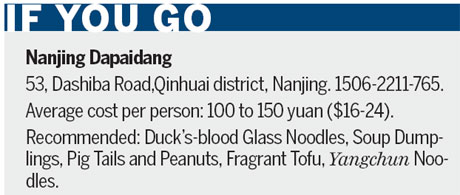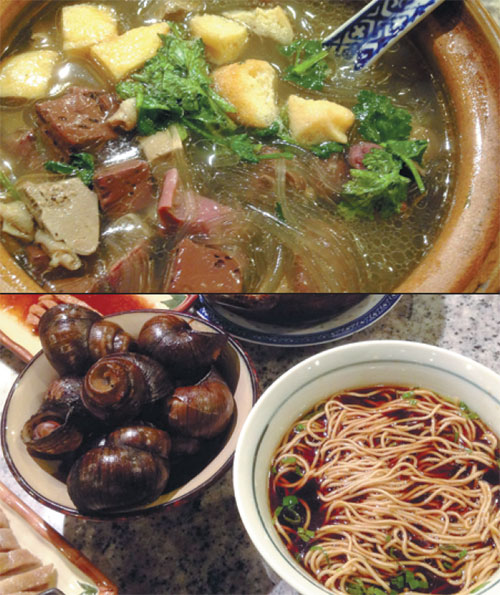Noodles a foodie's bright spot in Nanjing
Updated: 2014-03-01 08:26
By Pauline D. Loh in Shanghai (China Daily)
|
||||||||
Long before we left on the high-speed train, friends were telling us exactly where and what to eat in Nanjing. Their advice came tinged with passion and nostalgia as they eagerly shared favorite foods and places to dine.
Duck's-blood glass noodles was the most often recommended dish, and it seems to be the street food most associated with this city south of the Yangtze. Giving it a good run for its money was the next suggestion, fragrant tofu scented with five-spice and named after the orchid.
Above all, almost everyone said the best place to go to sample these local temptations was Nanjing Dapaidang, a successful franchise with many outlets all over the city, but with a very picturesque branch right by the Confucian Temple alongside the Qinhuai River.
|
Duck's-blood glass noodles (top) and Yangchun noodles (above right) are two popular dishes at successful franchise Nanjing Dapaidang. Photos by Pauline D. Loh / China Daily |
That was where we decided to go. It was soon clear we were not the only tourists after a bowl of genuine black pudding noodles. Our taxi driver knew exactly where we wanted to go and after a practiced glance backwards, started telling us the best spots in Nanjing to sightsee.
Our gregarious cabbie deposited us in front of the restaurant, and we were immediately impressed by the facade. Double rows of wax-paper lanterns lighted the entrance, and we were greeted by two gentlemen in Mandarin dress and quickly led to a table.
More wax-paper lanterns hung from the ceiling of the packed dining hall and they basically showed off the entire menu, with the names of dishes written on them in classic calligraphy. More conventional menus are also available tableside.
We ordered the duck's-blood noodles, of course, followed by a bowl of braised pig tails and peanuts, a platter of orchid tofu and another bowl of noodles, this time named after the spring sunshine or yangchun.
No gourmet gathering in Nanjing would be complete without the classic steamed buns delicately harboring pools of delicious meat juices. This is the tangbao, or soup dumplings. You have to be very careful biting into the piping-hot buns, or risk burning your tongue when the hot juices spurt.
There is no polite way to do it - you have to bite off the top of the bun, allow the steam to evaporate and slurp. You could also deconstruct the bun, breaking apart the skin and eating the filling separately, leaving the soup for last as a final triumph.
We also had huge whopping snails, the size of a baby's fist, that were braised in a savory brown sauce. The meat has to be artfully extracted with a spear-and-twist motion. I must say I enjoyed the muscular part of the snail best, although the spouse and our dining companions did not seem to mind the crunch of baby snails hidden in the inner parts.
My favorite was the pig's tail, with its perfect balance of skin, bone and meat. Here, the little segments are braised so long that they fall off the bone, leaving clean little sections of vertebrae. The braising sauce is slightly sweet, and while I liked it, the old Beijingers with me complained a little.
I found this true throughout the trip and it brought home the differences between northern and southern palate preferences.
Beijingers and other citizens north of the Yangtze are used to heavy seasonings, and they like their dishes soused in thick gravies flavored by cumin, fennel and star anise.
South of the Yangtze, palates are more delicate, and sensitive to the freshness of ingredients. They are blessed, too, because they do get a good variety of produce from land, sea and river. And, because of that, they prefer a lighter touch when it comes to adding sauces and spices.
Nanjing Dapaidang certainly gives you a good feel of what the local cuisine is like. Judging from the accents around us that evening, it is patronized by a good mix of locals and visitors alike, which is pretty good testimony.
As an added bonus, if you go during the evenings, you also get to enjoy pingtan, the heart-rending melodies and songs that are performed at all the traditional teahouses.
The restaurant has a couple of branches in Beijing as well, but these may not have the complete repertoire of offerings. To get a true taste of Nanjing, you really have to make the trip.
paulined@chinadaily.com.cn

(China Daily 03/01/2014 page12)

 Gorgeous Liu Tao poses for COSMO magazine
Gorgeous Liu Tao poses for COSMO magazine
 Post-baby Duchess
Post-baby Duchess
 Victoria Beckham S/S 2014 presented during NYFW
Victoria Beckham S/S 2014 presented during NYFW
 'Despicable' minions upset Depp's 'Lone Ranger' at box office
'Despicable' minions upset Depp's 'Lone Ranger' at box office
 'Taken 2' grabs movie box office crown
'Taken 2' grabs movie box office crown
 Rihanna's 'Diamonds' tops UK pop chart
Rihanna's 'Diamonds' tops UK pop chart
 Fans get look at vintage Rolling Stones
Fans get look at vintage Rolling Stones
 Celebrities attend Power of Women event
Celebrities attend Power of Women event
Most Viewed
Editor's Picks

|

|

|

|

|

|
Today's Top News
Michelle Obama, kids will visit China
China embraces market forces
Sino-Germany electronic trade surges
The bitter truth about too much sugar
US: Train depot attack 'terrorism'
US halts military engagements with Russia
First Lady to visit China in March
Terrorists in Kunming attack busted
US Weekly

|

|








